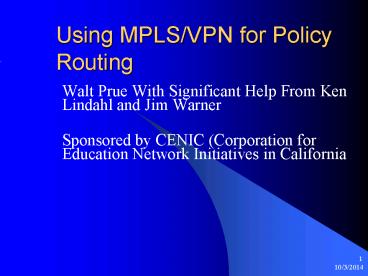Using MPLS/VPN for Policy Routing - PowerPoint PPT Presentation
Title:
Using MPLS/VPN for Policy Routing
Description:
Walt Prue With Significant Help From Ken Lindahl and Jim Warner ... Cisco suggested MPLS/VPN as a possible solution to CENIC's policy routing needs. ... – PowerPoint PPT presentation
Number of Views:26
Avg rating:3.0/5.0
Title: Using MPLS/VPN for Policy Routing
1
Using MPLS/VPN for Policy Routing
- Walt Prue With Significant Help From Ken Lindahl
and Jim Warner - Sponsored by CENIC (Corporation for Education
Network Initiatives in California
2
Introduction
- Cisco suggested MPLS/VPN as a possible solution
to CENICs policy routing needs. - CENIC needs to know if it will scale to the
requirements of the network.
3
Agenda
- Define Problem
- Examine Ciscos ability to solve our problem
- Viability of Ciscos solution
- Junipers Compatibility with Ciscos MPLS/VPN
4
Overview
- Does it scale to 100,000 routes?
- Can the existing equipment be used?
- Can it be maintained?
- Can CENIC introduce technology with minimal
disruption? - Can Junipers play too?
5
Vocabulary
- MPLS (MultiProtocol Label Switching)
- VPN (Virtual Private Network)
- VRF (VPN Routing and Forwarding)
- PE (Provider Edge) router
- P (Provider) router
- CE (Customer Edge) router
6
MPLS
Exp
Label
S
TTL
IP
14
IP
P
IP
23
PE
IP
PE
17
IP
Tag in Tag out I/F out
1 55 4
14 23 2
P
7
MPLS Issues
- MPLS over ethernet
- MTU discovery
- TTL
- Traceroute Across MPLS Enabled Net
- MPLS and ATM
8
MPLS/VPN
PE
PE
10.1.1.1
134.1.17.1
ip vrf cust-a rd 1100 route-target export
1100 route-target import 1100
cust-a VRF
BGP Table
Route Nexthop
10.1.1.0 10.1.1.1
192.168.6.0 10.1.1.1
128.2.0.0 134.1.17.1
route RD
10.1.1.0 1100
128.1.0.0
192.168.6.0 1.100
9
Policy Routing on CENIC
ISP-B
ISP-A
Cisco
SB
CIT
SB Campus
CIT Campus
ESnet
UCLA Campus
UCLA
USC
USC Campus
10
Routing Connectivity Matrix
11
Ciscos MPLS/VPN
- Current rel. 12 software cant support 100,000
routes - Engine 1 gigabit ethernet ports couldnt support
MPLS/VPN - MPLS/VPN doesnt currently support multicast
- Cisco can forward MPLS traffic at near OC-12 line
rates with engine 0 line cards - A workaround solution exists for multicast and
100,000 routes problem
12
Configuring and Maintaining MPLS/VPN
- Configuring and syntax was straight forward (see
below) - Troubleshooting was reasonable but a bit
different than net engineers are used to - Installing on existing network would be
disruptive - Each campus would need two logical ports for
access to multicast and ISP service (use to
reduce installation disruption ) - Cisco has MPLS/VPN Tools Available
13
Syntax (Global)
ip vrf VPN-A rd 521 route-target import
123341 route-target import 45561
route-target export 521 route-target import
521
14
Per CE I/F
interface serial0 ip vrf forarding VPN-A
ip address 10.1.2.3 255.255.255.0
15
Per Trunk I/F
interface serial4/0/0 ip mpls mpls
label-distribution ldp ip address 1.2.3.4
255.255.255.0 Or globally as mpls label
protocol ldp
16
Routing
router bgp 11422 no bgp default ipv4-unicast
neighbor 2.3.4.5 remote-as 11422 neighbor
2.3.4.5 update-source loopback0 ...
17
Routing (cont.)
address-family ipv4 vrf VPN-A neighbor 1.2.3.4
remote-as 52 neighbor 1.2.3.4 activate no
auto-summary no syncronization
exit-address-family address-family vpnv4
neighbor 2.3.4.5 activate neighbor 2.3.4.5
send-community extended exit address-family
18
Junipers and MPLS/VPN
- Compatible if LDP used instead of TAG
distribution - A bit more complex to configure
- Can handle 200,000 routes
- Can forward at OC-12 Line Rates
19
Summary
- MPLS/VPN can be used to solve our policy routing
problems - Ciscos cant do MPLS/VPN with full routes or
supporting multicast today - With a modified network design MPLS/VPN may be
our solution
20
Where to Get More Information
- RFC2547 BGP/MPLS VPNs
- RFC 3031 Muliprotocol Label Switching
Architecture - MPLS and VPN Architectures Cisco Press
- Juniper Documentation CD-ROM Release 5.0

